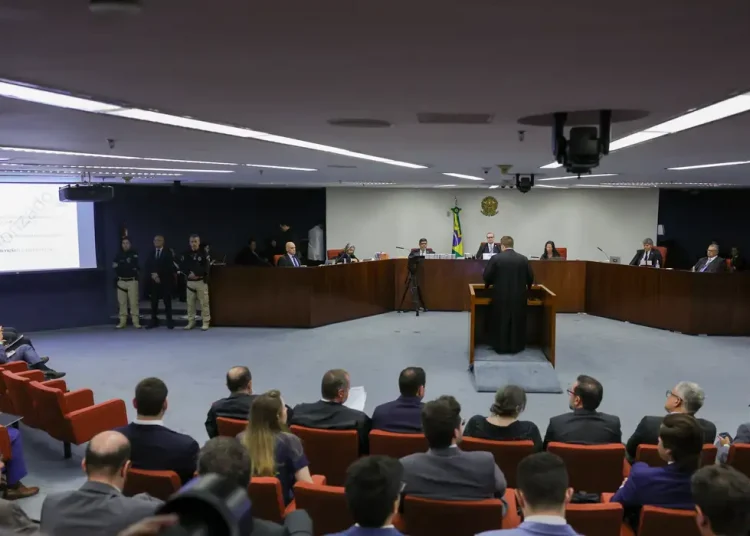In an interview to the Três por Quatro podcast by BdF, researchers Ana Penido and Jorge Rodrigues, from the Tricontinental Institute and the International Defense and Security Studies Group, and former congressman José Genoino analyze the trial of Brazil’s former president Jair Bolsonaro (Liberal Party) and seven other defendants at the Supreme Federal Court (STF), which investigates their involvement in an attempted coup after the 2022 elections. The trial is seen as unprecedented and potentially transformative for the country’s military institutions.
According to Ana Penido, the case breaks with Brazil’s historical pattern of shielding military personnel from accountability. “It’s unprecedented for several reasons,” she says. One major shift is the jurisdiction: “We’re seeing this trial take place in the civilian justice system” rather than in military courts, which have historically applied different standards and sentences to civilians and military actors for the same crimes.
She also highlights that high-ranking officials are facing trial — including an active-duty officer, Lieutenant Colonel Mauro Cid, Bolsonaro’s former aide-de-camp, who resigned from the Army earlier this week. “This contradicts the idea that ‘military men are never convicted,’” she adds. “Leftist officers were harshly punished in the past; the same has never happened to those on the right.”
Still, Penido warns that convictions alone won’t prevent future coup attempts. “It’s the same logic as saying: if we had punished those who orchestrated the 1964 coup, we wouldn’t have had what happened to Dilma in 2016. That’s a dangerous assumption,” she argues. For her, only “institutional reform” within the armed forces can prevent new threats to democracy.
On recent discussions in Congress about granting amnesty to those involved in the 2023 events, Penido notes that there’s been no institutional endorsement from the military. She sees an internal strategy to “cut off a finger to save the hand”, narratives that seek to disconnect the institution from the individuals who committed crimes.
‘A reckoning with Brazil’s authoritarian legacy’
Genoino believes the trial is revealing “deep truths” about Brazil’s democracy and its military. “It’s a long-overdue reckoning with our authoritarian past, in which military oversight of civilian politics has always played a central role,” he says. He emphasizes the dominance of military figures among the defendants and notes that “the central political command came from the president himself.”
For Genoino, the trial introduces key legal definitions: “This is the first time Brazilian law frames a coup d’état, armed action, and criminal organization as crimes of this nature.” He calls the case a “historic opportunity” to challenge military influence and reshape Brazil’s defense policy. “The armed forces’ supreme command belongs to the civilian power, which derives from the people’s vote,” he asserts.
He also advocates a strategic restructuring of Brazil’s military, focusing on “maritime borders, airspace, access to sensitive technology,” and regional partnerships. “Brazil lacks a coherent national defense policy,” he says.
Civilian control and the cost of the armed forces
Jorge Rodrigues rejects the narrative that generals were merely supporting actors in Bolsonaro’s government. “Given how deeply military officials embedded themselves in the federal administration, it’s implausible to believe a coup attempt would happen without their knowledge or participation,” he argues.
To strengthen civilian control over the military, Rodrigues proposes both immediate and long-term reforms. First, he says, “Defense Minister José Múcio Monteiro should be removed,” due to what he sees as the ministry’s failure to advance “robust defense policy discussions.” He also suggests involving Congress in the approval process for generals’ promotions, bringing the legislature closer to its oversight responsibilities.
When asked about the military’s size and cost, Rodrigues says the trial creates an opportunity for broader debate. “Why is this institution so expensive? What is its function? We need to ask ourselves: What is this tool for, and how does it serve national defense?”




